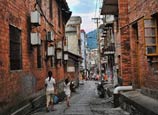
Now that large swathes of China are frequently shrouded in smog people may no longer believe that it is a sporadic extreme weather condition that befalls certain regions.
A National Development and Reform Commission report, published on Thursday, lends credence to the contention by saying that a quarter of the Chinese mainland has been shrouded in and some 600 million people have been affected by smog since the beginning of this year. Citing Beijing as an example, the report says that in January the capital experienced only five days which met the grade-II weather standard.
The pressure of economic downturn and increasing industrial energy and electricity consumption, however, pose a tough challenge to China's energy conservation and emission reduction efforts, the NDRC warned.
In these times of economic difficulties, there is a worrisome possibility that the government will loosen supervision of energy conservation to ensure economic growth. The NDRC report says that from January to May, China's industries consumed more than 1.1 billion tons of standard coal, a year-on-year increase of 2.98 percent. It also says that the country's energy consumption per unit of GDP fell by 5.5 percent in the first two years of the 12th Five-Year Plan period (2011-15), achieving only 32.7 percent of the five-year target, 7.3 percentage points lower than required.
But preference for economic growth and going slow on efforts for energy conservation and emission reduction will exacerbate air pollution.
If unchecked, air pollution will become a more potent public health hazard. According to a recent study conducted by researchers from China, Israel and the US on pollution and mortality in China's 90 cities between 1981 and 2000, the average lifespan of 500 million people living north of the Huaihe River is 5.5 years shorter than their compatriots in the south because the region burns coal to provide people heating in winter. The accuracy of the study may be in doubt, but the increasing number of respiratory diseases in the north shows that smog and pollution have indeed affected people's health.
Economic growth is for the benefit of the people, but it has to be compromised, if not altogether sacrificed, when it starts harming the very same people.
















 Migrant workes' high incomes not that rosy
Migrant workes' high incomes not that rosy


![]()
